

Rethinking Life. John Merrow: Who Is America's Most Influential Educator? A month or so ago, I speculated about the most influential person in American education -- then two weeks ago I expanded upon those musings in a feature for the New York Daily News.
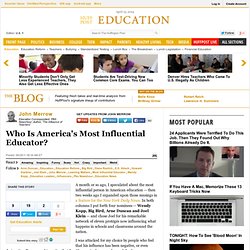
In both columns I put forth four nominees -- Wendy Kopp, Big Bird, Arne Duncan and Joel Klein -- and chose Joel for his remarkable network of eleven protégés now influencing what happens in schools and classrooms around the nation. I was attacked for my choice by people who feel that his influence has been negative, or even destructive. Few seemed to notice that I neither praised nor condemned the former Chancellor's policies. No one challenged that he changed New York City schools in dramatic ways -- nor could they.
Remember that before mayoral control, New York City had 32 separate districts, quite a few of them known as jobs programs for cronies with little regard for student outcomes. Rafe Esquith. Rafe Esquith is an award-winning American teacher at Hobart Boulevard Elementary School, in Los Angeles, California, where he has taught since 1984.
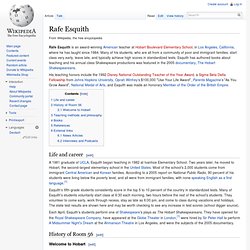
Many of his students, who are all from a community of poor and immigrant families, start class very early, leave late, and typically achieve high scores in standardized tests. Esquith has authored books about teaching and his annual class Shakespeare productions was featured in the 2005 documentary, The Hobart Shakespeareans. His teaching honors include the 1992 Disney National Outstanding Teacher of the Year Award, a Sigma Beta Delta Fellowship from Johns Hopkins University, Oprah Winfrey’s $100,000 "Use Your Life Award", Parents Magazine’s "As You Grow Award", National Medal of Arts, and Esquith was made an honorary Member of the Order of the British Empire.
Life and career[edit] The Curfew. The Curfew is an online interactive drama created by Littleloud, published by Channel 4 and written by comic book author, Kieron Gillen.
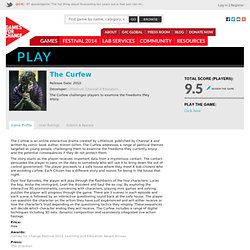
The Curfew addresses a range of political themes targeted at young people, challenging them to examine the freedoms they currently enjoy and the potential consequences if they do not protect them. The story starts as the player receives important data from a mysterious contact. The contact persuades the player to pass on the data to somebody who will use it to bring down the out of control government. The player proceeds to a safe house where they meet 4 Sub-citizens who are avoiding curfew. University of Chicago Laboratory Schools: Home. Northern Virginia Private Schools. Full text of "The Dewey School The Laboratory School Of The University Of Chicago 1896-1903" What Einstein, Twain, and Forty Eight Other Creative People Had to Say About Schooling. Throughout history, from Plato on, creative people have spoken out against the stultifying effects of compulsory education .
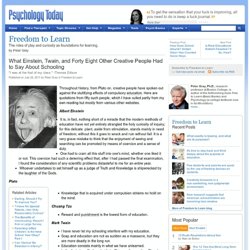
Here are quotations from fifty such people, which I have culled partly from my own reading but mostly from various other websites. Albert Einstein It is, in fact, nothing short of a miracle that the modern methods of education have not yet entirely strangled the holy curiosity of inquiry; for this delicate plant, aside from stimulation, stands mainly in need of freedom; without this it goes to wrack and ruin without fail. It is a very grave mistake to think that the enjoyment of seeing and searching can be promoted by means of coercion and a sense of duty. One had to cram all this stuff into one's mind, whether one liked it or not. Plato Knowledge that is acquired under compulsion obtains no hold on the mind. Chuang Tzu Reward and punishment is the lowest form of education. Mark Twain I have never let my schooling interfere with my education.
Oscar Wilde Woody Allen H. Alfie Kohn. Alfie Kohn (born October 15, 1957 in Miami Beach, Florida, United States) is an American author of child education, parenting, and human behavior.
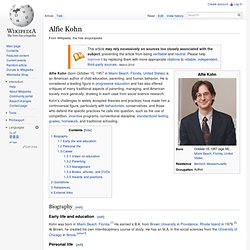
He is considered a leading figure in progressive education and has also offered critiques of many traditional aspects of parenting, managing, and American society more generally, drawing in each case from social science research. Biography[edit] Herbert Kohl. Herbert Kohl (educator) Herbert R.
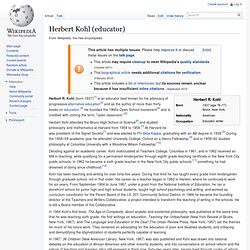
Kohl (born 1937) is an educator best known for his advocacy of progressive alternative education[2] and as the author of more than thirty books on education.[3] He founded the 1960s Open School movement[4] and is credited with coining the term, "open classroom. "[5] Rafe Esquith and The Hobart Shakespeareans Official Website. About KurtHahn.org. Kurt Hahn was a key figure in the development of experiential education. He was the founder of the the Atlantic College, the first United World College, the Duke of Edinburgh's Award, Gordonstoun, Outward Bound, and Salem. In addition, many other institutions, such as the Atlantic Challenge, the Kurt Hahn Trust, and Round Square, were initiated by others who were inspired by his ideas.
He was born June 5th, 1886 and died December 14th, 1974. KurtHahn.org is dedicated to his philosophy and the role of his ideas in the future of experiential education. On this Web site you will find biographical information, links to schools inspired by his philosophy, and a selection of his writings. Administrative contacts: contact@kurthahn.org Special thanks to the Outward Bound International Archives and Mark Zelinski for photographs.
Please visit www.outwardbound.net and www.MarkZelinski.com.
John Dewey My Pedagogic Creed. The Online Books Page: Search. Examples: Entering austen, jane in the Author field finds books by Jane Austen.
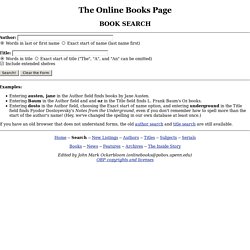
Entering Baum in the Author field and and oz in the Title field finds L. Frank Baum's Oz books. Watch. A few thoughts for a young man: a ... - Horace Mann. T. C. Worsley. Thomas Cuthbert Worsley (1907–1977), who wrote as T.
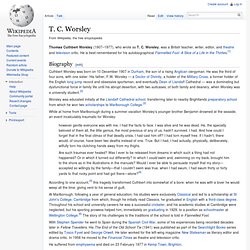
C. Worsley, was a British teacher, writer, editor, and theatre and television critic. He is best-remembered for his autobiographical Flannelled Fool: A Slice of a Life in the Thirties.[1] Biography[edit] Cuthbert Worsley was born on 10 December 1907 in Durham, the son of a rising Anglican clergyman. While at home from Marlborough during a summer vacation Worsley's younger brother Benjamin drowned at the seaside, an event incalculably traumatic for Worsley: however gentle everyone was with me, I had the facts to face. According to one account,[5] this tragedy transformed Cuthbert into somewhat of a bore: when he was with a lover he would weep all the time, giving vent to his sense of guilt. Tsunesaburo Makiguchi. Tsunesaburō Makiguchi (牧口 常三郎, Makiguchi Tsunesaburō 1871–1944) was a Japanese educator who founded and became the first president of Soka Gakkai.
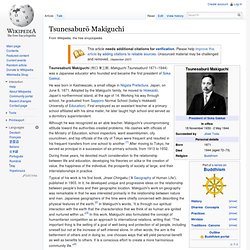
He was born in Kashiwazaki, a small village in Niigata Prefecture, Japan, on June 6, 1871. Adopted by the Makiguchi family, he moved to Hokkaidō, Japan's northernmost island, at the age of 14. Working his way through school, he graduated from Sapporo Normal School (today's Hokkaidō University of Education). First employed as an assistant teacher at a primary school affiliated with his alma mater, he later taught high school and served as a dormitory superintendent. Rafe Esquith. Experiments in Democratic Education: Dewey's Lab School and Korczak's Children's Republic. For democracy to thrive, students increasingly need to participate in democratic education.
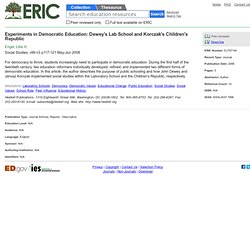
James Samuel Coleman. James Samuel Coleman (May 12, 1926 – March 25, 1995) was an American sociologist, theorist and empirical researcher, based chiefly at the University of Chicago. He was elected president of the American Sociological Association. Coleman studied the sociology of education, public policy, and was one of the earliest users of the term "social capital". His Foundations of Social Theory influenced sociological theory. His The Adolescent Society (1961) and "Coleman Report" (Equality of Educational Opportunity, 1966) were two of the most heavily cited books in educational sociology.[1] The landmark Coleman Report helped transform educational theory, reshape national education policies, and influenced public and scholarly opinion regarding the role of schooling in determining equality and productivity in the United States.[2]
Value-Creating Pedagogy. The four volumes of Soka kyoikugaku taikei (The System of Value-Creating Pedagogy) Tsunesaburo Makiguchi published the first volume of Soka kyoikugaku taikei (The System of Value-Creating Pedagogy) on November 18, 1930, when he was 59. Makiguchi was still active as principal of the Shirokane Elementary School and it was difficult for him to devote himself full-time to the work of putting his educational theories into writing. He thus asked his young disciple, Jogai (Josei) Toda (1900-58) to help in the work of compiling and editing the book, based on the outline Makiguchi had developed and his extensive body of notes.
Makiguchi is said to have always carried a notepad with him made from advertising fliers and other pieces of scrap paper. He would use this to jot down thoughts that came to him during the course of his day or to copy passages from books, newspapers or periodicals that he found relevant to or illustrative of his ideas. Makiguchi and Toda c.1930. Horace Mann. Horace Mann (May 4, 1796 – August 2, 1859) was an American education reformist. As a politician he served in the Massachusetts House of Representatives from 1827 to 1833. He served in the Massachusetts Senate from 1834 to 1837. In 1848, after serving as Secretary of the Massachusetts State Board of Education since its creation, he was elected to the US House of Representatives. Mann was a brother-in-law to author Nathaniel Hawthorne. Early life[edit]